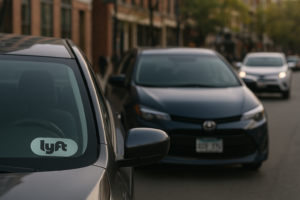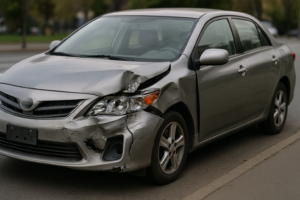Colorado Driver's Licenses for Immigrants
Colorado Senate Bill 24-182 is a new law that expands access to driver’s licenses for immigrants in the state, regardless of their legal status. This legislation seeks to improve road safety, strengthen communities, and support the workforce by removing barriers that have historically prevented many Colorado residents from obtaining driver’s licenses. Key changes include wider DMV access, simplified documentation requirements, and a modernized scheduling system, with full implementation planned by 2026.
Why Did Colorado Pass Senate Bill 24-182?
Colorado lawmakers passed SB 24-182 in large part to make the roads safer. Research from other states shows that when more people are legally able to drive, get tested, and obtain insurance, there are fewer accidents, hit-and-runs, and uninsured drivers on the road. These improvements benefit not just immigrant drivers but every Colorado resident, leading to lower insurance premiums and a more responsible driving culture overall.
Key safety benefits include:
- Fewer traffic fatalities (5–10% reduction in some states)
- Fewer hit-and-run incidents
- Lower costs related to uninsured accidents
Boosting Economic Participation
This law also recognizes the importance of reliable transportation for economic stability. Many immigrants work in essential industries like agriculture, healthcare, construction, and food service, but without the ability to legally drive, consistent employment can be difficult. SB 24-182 helps address workforce shortages while boosting individual earning power and tax contributions to the state economy.
Economic ripple effects include:
- Greater wage-earning potential (15–30% increase)
- Reduced employee turnover in essential sectors
- Increased consumer spending and tax contributions
Fixing a Flawed System
SB 24-182 addresses long-standing frustrations with the state’s prior program for undocumented drivers, passed in 2013. That version had too few DMV locations, overly strict documentation requirements, and long waitlists. The new law simplifies the process, increases access, and brings Colorado in line with modern best practices seen in other immigrant-inclusive states.
What Changes Does Senate Bill 24-182 Introduce?
Wider DMV Access
Under the previous system, immigrant drivers often had to travel hours to one of just a few DMV locations that processed their applications. That changed with SB 24-182. The law requires the Colorado DMV to offer immigrant license services at all full-service locations statewide by January 2026. This dramatically improves access for rural residents and reduces long wait times that have historically discouraged applicants.
Improvements include:
- Statewide DMV access by January 2026
- Easier access for rural and underserved communities
- Reduced travel time and missed work for applicants
Simplified Document Requirements
Many eligible drivers were excluded from the previous system because they lacked very specific documents like tax filings or ITINs. SB 24-182 broadens the list of acceptable documentation, recognizing the variety of ways immigrants can establish identity and residency. This change allows a wider group of immigrants—especially those newer to the state or country—to begin the licensing process without unnecessary roadblocks.
Accepted documents include:
- Foreign passports or consular identification cards
- Certified translated birth certificates
- Foreign driver’s licenses (valid or expired within 5 years)
- Proof of Colorado residency (utility bills, lease agreements, bank statements)
- Tax records (optional, no longer mandatory)
Modernized Scheduling
One of the most common frustrations with the old system was the inability to get an appointment in a reasonable time frame. SB 24-182 addresses this by overhauling the DMV’s scheduling platform. The new system expands availability, supports multiple languages, and even allows community partners to host licensing events in trusted spaces. These improvements make it easier than ever to start the process, especially for working families and non-English speakers.
New scheduling features include:
- Evening and weekend appointments
- Multilingual appointment system (20+ languages)
- Dedicated phone line for applicants without internet
- DMV-supported community licensing events
Enhanced Privacy Protections
For many immigrants, concerns over personal data being shared with immigration authorities kept them from applying for a license. SB 24-182 includes robust privacy protections to prevent this kind of misuse. The law explicitly prohibits the DMV from sharing applicant information with immigration enforcement unless required by a court order, helping applicants feel more secure about entering the system.
Privacy enhancements include:
- Prohibition on proactive data sharing with immigration agencies
- Limited access only via valid court orders
- Data used solely for licensing purposes
What Are The Benefits of Senate Bill 24-182?
1. Safer Roads for All
When more drivers are trained, tested, and insured, everyone benefits. States with similar laws report notable improvements in public safety and insurance metrics.
Key safety benefits include:
- Fewer traffic fatalities (5–10% reduction in some states)
- Fewer hit-and-run incidents
- Lower costs related to uninsured accidents
2. Economic Stability
Legal access to transportation helps immigrants maintain employment, earn more, and support industries in need of workers.
Economic ripple effects include:
- Greater wage-earning potential (15–30% increase)
- Reduced employee turnover in essential sectors
- Increased consumer spending and tax contributions
3. Improved Public Health
Reliable transportation allows immigrants to access medical care, reducing reliance on emergency services and improving overall public health.
4. Stabilized Insurance Markets
By increasing the pool of insured drivers, insurance markets become more balanced and less financially burdensome on current policyholders.
How to Apply for a Driver's License Under SB 24-182
Applying for a driver’s license under Colorado SB 24-182 has become much more accessible thanks to streamlined documentation requirements, an improved scheduling system, and expanded DMV access across the state. While the core steps remain similar to those for standard licenses, understanding the specific resources and tools available under this program can help applicants navigate the process more efficiently and confidently.
Step 1: Gather Required Documents
The first and most important step is collecting the right paperwork. Thanks to the broader list of acceptable documents under SB 24-182, this step is more accessible than before. Applicants should gather these items in advance to avoid delays or rescheduled appointments. Many community organizations also offer document review services to help ensure everything meets DMV standards.
Accepted documents include:
- Foreign passport or consular ID
- Certified translated birth certificate
- Valid or expired (within 5 years) foreign driver’s license
- Colorado residency proof (e.g., lease, utility bill, bank statement)
- Optional tax records for added documentation
🔗 Helpful Links:
- Colorado DMV – Document Checklist (SB 251 Licenses) (SB 24-182 builds on this program; updates will be reflected here as rollout continues)
- DMV Forms & Translations – Search for downloadable documents in multiple languages
- Colorado DMV Proof of Address Guide – Lists acceptable documents for residency verification
Step 2: Schedule an Appointment
Once your documents are ready, the next step is to book an appointment. With the newly improved scheduling system, this process is now much more user-friendly. Whether you need a weekend slot, prefer to schedule in your native language, or require phone-based support, there are now multiple ways to get on the calendar.
You can schedule via:
- The Colorado DMV Appointment Portal
- Appointments: 720-295-2965 (303-205-2335 for CO-RCSA services) for help with scheduling, if you do not have internet access
- A Visual Step-by-Step Guide for Scheduling an Appointment on myDMV
- Community licensing events hosted by partner organizations like CIRC, Servicios de La Raza, and others
Step 3: Testing
Just like any other driver in Colorado, immigrants must prove they understand the rules of the road. This means passing a written knowledge test and, in many cases, a driving skills test. SB 24-182 ensures these exams are accessible by offering study guides in multiple languages and permitting interpreters when needed.
Requirements include:
- Written knowledge test (available in multiple languages)
- Driving skills test (interpreters allowed)
- Practice hour documentation for first-time drivers
🔗 Helpful Links:
- Driver License Practice Tests – Colorado DMV
- Colorado Driver Handbook (Multilingual)
- Colorado Drive Time Log Sheet – Required for new drivers under 21
Step 4: Renewals
Previously, licenses under the immigrant driver program had shorter validity and stricter in-person renewal requirements. SB 24-182 brings immigrant licenses in line with standard ones. Now, licenses are valid for four years and can be renewed online or at any full-service DMV.
Renewal improvements:
- Four-year license validity
- Online and statewide in-person renewal options
- Renewal reminders are sent 30–45 days before expiration
🔗 Helpful Links:
- Colorado DMV Online Services – Renew licenses, update info, and more
- Find a DMV Office Near You – List of all full-service DMV locations
Important Limitations to Understand
Restrictions on Use
Although SB 24-182 licenses offer driving privileges, they cannot be used for federal identification. These licenses contain a marking that distinguishes them from REAL ID-compliant versions, which limits their use in some situations. Understanding these limitations can help avoid confusion and potential legal issues.
These licenses are not valid for:
- Domestic air travel (TSA checkpoints)
- Voting in U.S. elections
- Receiving federal public benefits
- Proving lawful immigration status
- Employment verification (I-9 purposes)
Privacy Limitations
While SB 24-182 includes meaningful privacy protections, no law can completely guarantee data security. Federal agencies with a valid court order may still access DMV records in certain legal situations. Applicants with complex immigration cases are strongly advised to consult with an immigration attorney beforehand.
Out-of-State Recognition
Most states will accept a Colorado-issued license regardless of the holder’s immigration status—but not all. Some states have passed laws that refuse to recognize licenses issued without lawful presence. Immigrant drivers should verify recognition policies in any state they plan to visit or travel through.
Funding Considerations
Unlike the old program, SB 24-182 is funded in part by the state. However, this could change in future legislative sessions depending on budget priorities. Advocates recommend applying as early as possible to ensure access while the program is fully operational.
Community Resources Available to Applicants
Several nonprofit and grassroots organizations across Colorado offer direct support to immigrants navigating the SB 24-182 licensing process. These trusted resources can help you prepare your documents, schedule appointments, practice for tests, and access legal and financial assistance.
Application Assistance
Local organizations host free or low-cost workshops where bilingual volunteers walk applicants through every step of the process. These events are held throughout the state and are ideal for first-time applicants or those unfamiliar with DMV procedures.
Organizations offering application help:
- Colorado Immigrant Rights Coalition (CIRC) – Offers workshops, document prep, and advocacy for immigrant rights.
- Servicios de La Raza – Provides bilingual assistance for license applications and support services.
- Mile High United Way – 211 Colorado – Use the 2-1-1 service to find local immigrant assistance workshops near you.
Study Materials
To help applicants prepare for the written and driving tests, various DMV-approved materials are available online in multiple languages. Many nonprofits also host study groups and provide tutoring sessions tailored to first-time test takers.
Where to find study resources:
- Colorado DMV – Driver Handbook & Study Materials – Available in English and Spanish, with links to additional translations.
- The Learning Source – Offers adult education programs, including English and test preparation.
- Focus Points Family Resource Center – Provides driver’s license prep classes and ESL support.
Legal Consultations
Free or low-cost legal services can help you understand how applying for a license may interact with your immigration status. These consultations are especially important if you have pending immigration proceedings or past legal concerns.
Organizations offering legal help:
- Rocky Mountain Immigrant Advocacy Network (RMIAN) – Provides legal screenings and community education across Colorado.
- Justice and Mercy Legal Aid Center (JAMLAC) – Offers legal consultations on immigration and civil matters.
- Catholic Charities of Denver – Immigration Services – Offers immigration legal support, especially for vulnerable populations.
Financial Assistance
While the license fee under SB 24-182 is relatively low at $33, it can still pose a barrier for some families. A number of community organizations and local foundations offer fee waivers, grants, or no-interest loans to cover licensing and insurance costs.
Places to seek financial assistance:
- Community Resource Center of Colorado – Maintains a directory of community support organizations offering financial assistance.
- Mi Casa Resource Center – Offers financial coaching and can connect applicants to fee assistance programs.
- The Denver Foundation – Funds equity-based programs through local nonprofits that may offer direct support.
(FAQ) Frequently Asked Questions
Can I use my foreign driver's license as proof of driving experience?
Yes, a valid foreign driver’s license or one expired less than five years can be used as proof of driving experience and may exempt you from some testing requirements.
Applicants with valid foreign licenses or those expired less than five years may be exempt from the driving skills test but will still need to pass the written knowledge test on Colorado traffic laws. The foreign license must be verified through a state-approved translation service or embassy certification. For licenses from countries with substantially different traffic systems, the DMV may still require a limited driving test focused on U.S.-specific rules. This recognition of foreign driving experience honors the skills immigrants bring with them while ensuring familiarity with local regulations.
Will getting this license affect my immigration case or status?
No, obtaining a driver’s license under this program has no direct impact on immigration proceedings or status. The law includes privacy protections to separate licensing from immigration enforcement.
Immigration lawyers and advocates involved in drafting the legislation ensured it included strong privacy safeguards. DMV employees are prohibited from asking about immigration status during the application process. Information collected is used solely for licensing purposes and cannot be proactively shared with immigration authorities. However, applicants should understand that like any government interaction, records do exist. Those with deportation orders or other complex immigration situations may wish to consult with an immigration attorney before applying, though the consensus among legal experts is that the benefits typically outweigh potential concerns.
How much does the license cost and how long is it valid?
The standard fee is $33, and licenses are valid for four years, the same as standard Colorado driver’s licenses.
The equalized fee structure and validity period represent significant improvements over the previous program, which charged higher fees for immigrant licenses. Financial assistance programs are available for low-income applicants through various community organizations. The four-year validity period aligns these licenses with standard Colorado licenses, eliminating a previously discriminatory difference. Renewal notices will be sent to the address on file approximately 30-45 days before expiration, and most renewals can be completed online once the program is fully implemented.
Can I use this license to board a domestic flight?
No, these licenses are not REAL ID compliant and cannot be used for boarding flights or entering federal facilities that require identification.
For air travel, license holders will need alternative identification such as a valid passport from their country of citizenship. The licenses contain a marking indicating they are not valid for federal identification purposes, as required by federal law. However, the design minimizes unnecessary differences from standard licenses to prevent discrimination in non-federal contexts. For entering federal buildings that require identification, a foreign passport remains the most reliable option for non-citizens without REAL ID-compliant documentation.



